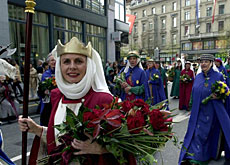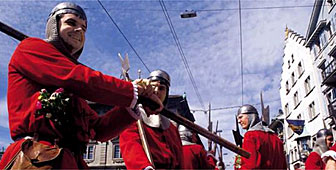One of Zurich’s oldest festivals accused of sexism

Thousands gather every year to watch the traditional Sechseläuten spring fair which is still organised by the city's all-male guilds.
Female participation in the event, which centres on a parade by the guilds’ members through Zurich, is limited to showering their favourites with bouquets of flowers from the roadside.
But some women are now seeking to play a more active role in this celebration of the city’s history, following the establishment in 1989 of a women-only guild.
The Society of Fraumünster, to give the guild its full name, was set up to commemorate the history of the women’s abbey in Zurich and its social importance in the 500 years leading up to the Reformation.
The guild also seeks to highlight the role which individual women have played in the city’s history.
So far, though, the women’s guild has failed to gain entry to the list of official guilds and is therefore barred from the Sechseläuten parade.
However the guild did win an important victory four years ago when the city authorities allowed them to stage a “demonstration” on the same day as the fair and on a similar route to that of the main procession.
Cabinet approval
The decision has effectively granted the women’s guild a “back door” into the fair for the past four years.
This time around, newly-elected Swiss cabinet minister Micheline Calmy-Rey agreed to join the women, lending further respectability to the alternative march.
“Originally we were only asking the guilds if they would let us take part in the fair as their guests. We were always denied, which is why we were forced to call our walk a demonstration,” women’s guild spokeswoman Jeannette Derrer told swissinfo.
“Basically, it’s a question of sexual equality. The guilds always claim that this is a private event, but we don’t think that a festival put on for the public on a public holiday and with the support of public money can ever be considered private.
“This is a public event which therefore has to follow constitutional law and guarantee equal rights for man and woman.”
At a reception in Zurich on Monday, Calmy-Rey said her presence should be seen as a “gesture of female solidarity”.
The foreign minister said she was committed to working towards equal rights between men and women.
Accusations denied
Having held great sway in Zurich for more than 500 years, before losing their last economic powers in the late nineteenth century, the traditional guilds aren’t keen to surrender their remaining rights over the running of the Sechseläuten.
But rather than feeling threatened by the women’s guild, the men seem somewhat bemused by the row. And they certainly don’t accept the argument that their exclusion of the women’s guild is based on sexism.
“There are only two types of guild in the guilds’ association,” points out spokesman Christian Steinmann. “Firstly there are the original guilds, founded in 1336 and representing various trades. Then there are the guilds which represent the villages or districts which became part of Zurich during its expansion in the 1860s.
“The women’s guild doesn’t fall into either of those categories. It just doesn’t fit in.
“After they were rejected, they tried every method they could think of and this argument about women’s rights is just the latest attempt. They seem to think they can find a political angle in all this which is pure nonsense.”
Politicians split
Political or not, the row has certainly attracted the attention of Zurich’s politicians, whose views on the subject seem more dictated by ideology than gender.
Despite agreeing to march with the tailors’ guild on Monday, city mayor (and member of the left-of-centre Social Democratic party) Elmar Ledergerber has criticised what he sees as stubbornness on the part of the traditional guilds.
Following his failed attempt to find a compromise, Ledergerber told the Tages-Anzeiger newspaper that the guilds’ decision would bring “undeserved shame” on the city as a whole.
As one of eight women guests on the traditional march, Rita Fuhrer disagrees with Ledergerber’s assessment. The head of the canton’s social welfare department and a member of the right-wing Swiss People’s Party, Fuhrer does not feel she is betraying her sex.
“This is all about tradition and I think it’s a shame that the women’s guild are trying to apply modern arguments about female equality to an historic event,” said Fuhrer.
“If we’re talking about social or political issues, then it’s a different matter. But when it comes to a tradition, I don’t think we should always be demanding the same things as the men.”
swissinfo, Mark Ledsom in Zurich
The traditional spring festival in Zürich began on Sunday with a children’s parade.
The actual festival took place on Monday with a large guild parade.
The highlight is the burning of the “Böögg”, the symbolic figure of winter, on the Sechseläuten green in front of the opera house.
According to legend, the faster the “Böögg” burns, the warmer and more beautiful the summer will be.
Today’s guilds are run as private social clubs with a total membership of around 3,500.
The earliest guilds were founded in 1336 and played a key role in Zurich life for more than 500 years.
They lost their economic influence in the 1830s but continue to organise the annual spring fair.
Swiss airlines CEO André Dosé and 2002 Nobel Prize winner Professor Kurt Wüthrich are among this year’s guest marchers.

In compliance with the JTI standards
More: SWI swissinfo.ch certified by the Journalism Trust Initiative


You can find an overview of ongoing debates with our journalists here . Please join us!
If you want to start a conversation about a topic raised in this article or want to report factual errors, email us at english@swissinfo.ch.